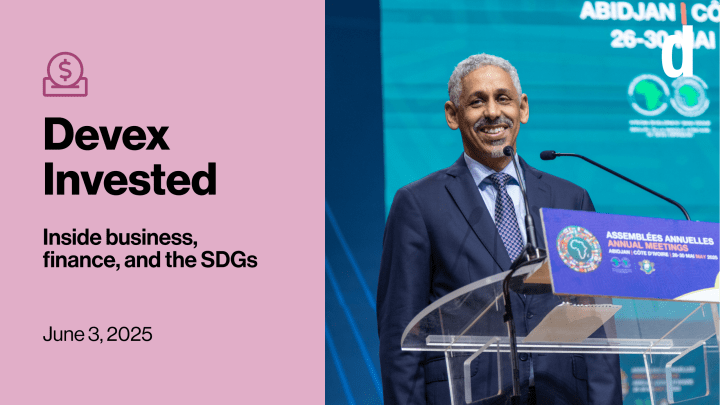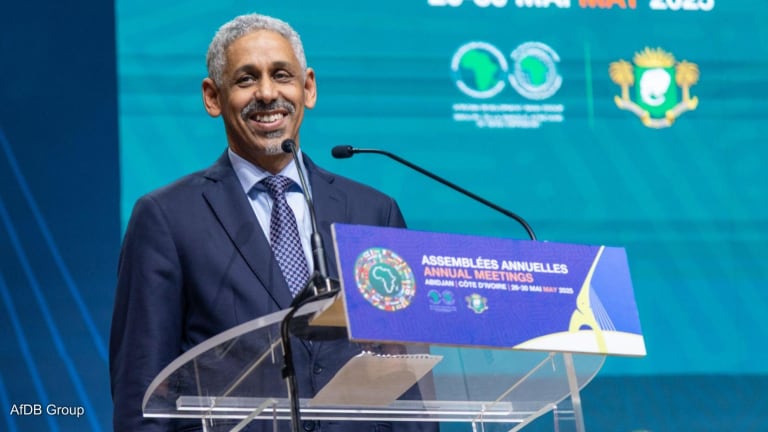
Sidi Ould Tah is stepping into one of Africa’s most influential economic roles — and into the shoes of Akinwumi Adesina, a president who tripled the African Development Bank’s capital over the last decade.
Tah, a former Mauritanian finance minister, secured a strong majority in the final round of presidential voting at last week’s AfDB annual meeting in a race shaped by regional politics: the southern Africa vote split, while some insiders pushed for a smaller country to take the helm after Nigeria’s long run.
Tah brings a familiar profile — decades in government and development finance — but also a network of relationships that may reshape AfDB’s direction. As head of the Arab Bank for Economic Development in Africa, he built strong ties with Gulf donors. “There is big interest from the GCC [Gulf Cooperation Council] countries to invest in Africa,” he told Bloomberg last month. “We are not really tapping all the potential of this region.”
He has also emphasized that unlocking private capital will be a priority of his.
He’s promised to move fast. Within his first 100 days, Tah says, he’ll convene development banks, credit rating agencies, and insurers to address private capital bottlenecks. He has also pledged during this period to meet with African think tanks to tackle data gaps, and consult with women and youth on the bank’s future direction.
His term begins Sept. 1, but the groundwork is already underway.
And in other AfDB news: Kevin Kariuki, the bank’s vice president for power, energy, climate and green growth, has an update on Mission 300, AfDB’s flagship joint initiative with the World Bank to bring electricity to 300 million Africans within five years. The project is holding private sector consultations this week in London.
The first cohort of countries published their energy compacts — essentially national master plans for electrification — back in January. This week’s consultations will highlight “three compacts from the first cohort on what reforms they have made to be able to attract greater private sector investment in the sector,” Kariuki told Ayenat last week. The sessions will also give the private sector a chance to provide feedback on draft compacts from the next cohort of countries, which are expected to be published this month.
Read: Mauritania’s Sidi Ould Tah elected African Development Bank president
Further reading: One year in, Mission 300 tests what it takes to power Africa
New blend
What does this year’s collapse of USAID mean for blended finance? According to a recent report from Convergence, a global blended finance network, not as much as you might think.
USAID may have been the top donor agency supporting blended finance last year with 68 commitments totaling $107 million, but its overall funding has been modest — accounting for just 2.1% of total concessional capital in blended finance annually since 2018.
“It’s a collapse of a significant player but it’s balanced by the fact that they weren’t doing large deals in the first place,” Joan Larrea, CEO of Convergence, tells Devex Senior Reporter Adva Saldinger.
Overall, there were 123 blended finance deals worth about $18.3 billion last year, down from a record $23.1 billion in 2023.
Three trends to know:
• Large blended finance deals over $100 million continue to focus on energy, financial services, and infrastructure through project, fund, or company investments.
• Nearly half of all blended finance deals were climate-related last year.
• There are a growing number of “whale” deals, worth over $1 billion.
Still, for Larrea, “Until we get mainstream capital into blended finance and making use of it, we’re not really accomplishing everything we should.”
Read: Blended finance shrinks slightly in 2024, but aid cuts cloud its future
Speaking of which …
Gavi, the Vaccine Alliance struck new ground recently, entering into a partnership with the Asian Infrastructure Investment Bank. By blending Gavi’s grant resources with AIIB loans, the idea is to help countries pay for vaccine introduction and procurement, and improve immunization infrastructure.
David Kinder, Gavi’s director of development finance, tells Devex that this is just the beginning, with Gavi planning at least two joint projects with AIIB in the next five years — if not more.
“One of the things that's sometimes an issue when you look across the MDB world is that the rates of lending for human capital can tend to be less than physical capital,” Kinder says. “And obviously, from an economic and a long-term health perspective, they're both really, really important.”
Read: Gavi eyes blended financing in new partnership with AIIB
Wellcome change
As CEO of the global charitable foundation Wellcome, John-Arne Røttingen is in charge of billions of dollars in global health spending. So when he writes, as he does in a recent Devex opinion piece, of the need for “a radical rethinking of the global health architecture,” it’s worth taking note.
The problems? “The global health system has become a complex, fragmented network,” Røttingen writes. “Individual programs may be efficient, but the system as a whole is not. It relies too heavily on medical tools and technologies at the expense of strengthening primary health care. It lacks clear accountability.”
The solutions? “National governments should be responsible for their populations’ health,” Røttingen writes, welcoming member states’ resolution at last month’s World Health Assembly to increase domestic spending on health and get better oversight of health financing.
In the meantime, Wellcome is conducting five dialogues, each led from a different part of the world, to reimagine a global health ecosystem. They are due to culminate by the end of this year.
Opinion: Global health can't run on charity — now is the time for reform
ICYMI: Can domestic financing solve the global health funding crisis?
Save your spot
In the lead-in to the Fourth International Conference on Financing for Development, or FfD4, in Seville, Spain, Devex is hosting a virtual event series for our Pro members to map what’s next for development finance.
This Thursday, June 5, British International Investment’s Chris Chijiutomi takes us inside BII’s Africa portfolio — including hard-won lessons from fragile markets and what makes a project bankable when everything’s on the line. Save your spot now.
If you are not yet a Devex Pro member, we offer a 15-day free trial of Pro which you can start today and gain access to this event series and all of our exclusive content and events.
Can MDBs step up?
Your next job?
Senior Talent Acquisition Specialist
Development Bank of Latin America and the Caribbean
Colombia | Brazil | Paraguay | Peru | Panama | Dominican Republic | El Salvador
Ahead of Seville, attention is also returning to multilateral development banks, which are increasingly being called on to do more — funnily enough, just as some of their largest shareholders’ aid budgets plummet.
Luckily, Richard Samans from the Brookings Institution argued at a recent Devex event, there’s enough underutilized “capital and capabilities in these institutions to triple the amount of ODA-related flows to well over 100 low- and middle-income countries for seven consecutive years.” Recycling mature infrastructure loans out into the market is one of Samans’ ideas.
But Homi Kharas, also from Brookings, struck a more pessimistic note.
“I think what you're seeing is a sense from people that small improvements are nice, but they're not really going to get us where we want to be,” Kharas said. “And my analogy is, if you are driving off a cliff, does it really matter if you drive off the cliff at a high speed or a slow speed? If you don’t brake in time, you go off the cliff, you’re still gone. So that’s a little bit of where we are right now.”
Watch: Can multilateral development banks step up to meet the moment? (Pro)
Related: What’s in the G20 road map to transform multilateral development banks?
What we’re reading
Forcing African development lenders to take losses in sovereign debt restructurings would set a dangerous precedent and increase the cost of financing on the continent, according to the president of the Eastern and Southern African Trade and Development Bank. [Bloomberg]
Save the Children has just appointed its first chief innovation officer who says, “We’re not best-placed to do everything ourselves.” [Devex]
Soaring debt repayments and a sharp reduction in lending have transformed China’s role in developing country finances from capital provider to debt collector. [Lowy Institute]
Foundations own huge amounts of stocks. Are they using them for good? [Devex Pro]





